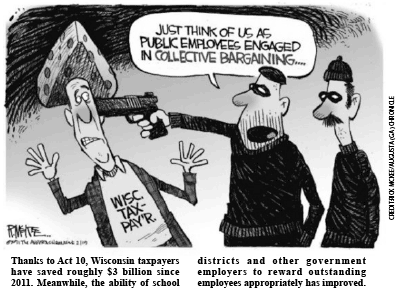Will Team Biden Weaponize Workers’ Pensions?
Big Labor abuse of worker pension and benefit funds as a means of advancing union bosses’ self-aggrandizing policy objectives is a familiar phenomenon.
Mark Mix: Decision Should Encourage Legislators Across the Nation
(Article first appeared in the September 2014 National Right to Work Committee Newsletter)
Government union bosses have spent more than three years and millions of dollars trying to get Wisconsin’s Act 10, which restricts their compulsory-unionism privileges, overturned in court.
 But in late July, a 5-2 majority on the Badger State’s Supreme Court may finally have put a stop to union lawyers’ schemes to circumvent the voting public and reinstate forced union dues and wide-ranging union monopoly bargaining in the government sector.
But in late July, a 5-2 majority on the Badger State’s Supreme Court may finally have put a stop to union lawyers’ schemes to circumvent the voting public and reinstate forced union dues and wide-ranging union monopoly bargaining in the government sector.
In early 2011, Gov. Scott Walker (R) infuriated union officials when he successfully advanced the measure now known as Act 10. Act 10 abolished forced union dues for teachers and many other public employees and also greatly narrowed the scope of government union monopoly bargaining in other ways.
In June 2012, Wisconsinites went to the polls in special “recall” elections orchestrated by Organized Labor.
Despite spending millions of dollars, mostly forced dues and fees exacted from workers, union bigwigs failed to unseat Gov. Walker and Lt. Gov. Rebecca Kleefisch in retaliation for their drafting and winning legislative approval of Act 10. In the November 2012 general elections, Wisconsin voters again rebuked the union brass, handing the Republican leaders responsible for Act 10 an 18-15 majority in the state Senate and retaining a large GOP majority in the state House.
Monopoly Bargaining ‘Remains a Creation of Legislative Grace’
In addition to pouring vast sums of forced-dues money into electoral politics to punish Act 10 proponents, union officials have also repeatedly gone to court to get back all of their monopoly-bargaining and forced-dues privileges.
But while Big Labor has been able to use the legal system to keep Act 10’s future cloudy for several years, none of the significant contentions union lawyers arguing against the statute in federal and state court has ultimately been upheld.
In the most recent federal ruling concerning Act 10, for example, a unanimous three-judge appeals court panel in Chicago found this spring that Act 10 does not interfere with union bosses’ First Amendment right to advocate for their members.
The panel specifically found that no First Amendment rights are affected when a state bans municipalities from negotiating with monopolistic unions, or drastically shortens the list of issues that may be negotiated.
With regard to state litigation, the majority opinion penned by Wisconsin Supreme Court Justice Michael Gableman in Madison Teachers, Inc. v. Walker likely represents the final word on the constitutionality of Act 10.
Try as they might, concluded Jusice Gableman, union lawyers could not get around the fact that neither the U.S. nor the Wisconsin Constitution mandates public-sector union monopoly bargaining.
“No matter the limitations or ‘burdens’ a legislative enactment places on the collective bargaining process,” he reasoned, “collective bargaining remains a creation of legislative grace . . . .”
Positive Developments in Wisconsin Already Inspiring Reformers in Other States
Even before this year’s federal appeals court and Wisconsin Supreme Court rulings derailed years of Big Labor efforts to get Act 10 judicially overturned, more and more elected officials and candidates in other states were publicly acknowledging that this statute’s success was encouraging them to push for parallel reforms.
National Right to Work Committee President Mark Mix commented:
“Nonpartisan analysts essentially agree with Gov. Walker that Act 10 has saved taxpayers roughly $3 billion since it took effect. Meanwhile, the ability of the state and its localities to recruit and reward good public employees has actually improved.
“School districts, for example, no longer have to waste millions and millions of dollars buying overpriced health insurance from a teacher union subsidiary, because they no longer need teacher union bosses’ acquiescence to change their insurance providers.
“Teachers can thus get better health insurance at a lower cost, and the savings can be used for better purposes such as rewarding good teachers or reducing taxes.
“And now that Act 10, which grass-roots Right to Work advocates in Wisconsin helped enact and which National Right to Work Foundation attorneys have helped defend, has withstood Big Labor’s court challenges, I’m optimistic legislators nationwide will be encouraged to seek adoption of similar measures.”

Big Labor abuse of worker pension and benefit funds as a means of advancing union bosses’ self-aggrandizing policy objectives is a familiar phenomenon.

Leaked CTU Proposals Won’t Do Anything to Improve Schools’ Poor Performance

What impact does handing a union monopoly power to deal with your employer on matters concerning your pay, benefits, and work rules have on your pay?